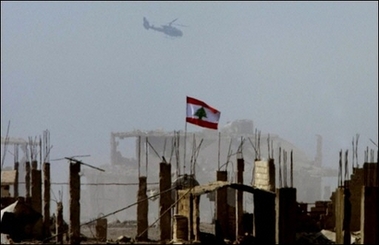 BBC, Lebanese troops said they had largely defeated Islamist rebels in a northern refugee camp, but continued their siege amid sporadic shelling and gunfire. Officials said the gunfire came from mopping up operations, and explosions were booby traps being destroyed. Leaders of Fatah al-Islam at the Nahr al-Bared camp were on the run, Defence Minister Elias Murr said on Thursday. A month of fighting has left 170 people dead, in Lebanon’s worst internal violence since the 1975-90 civil war. Some correspondents said parts of the old camp – densely populated areas packed with long-term Palestinian refugees – were still outside the army’s control. The so-called new camp, where gunfire has been focused, is now a devastated wasteland of shattered concrete. Mr Murr had told Lebanese TV that the army had "crushed those terrorists". "What is happening now is some clean-up that the army’s heroes are carrying out, and dismantling some mines," he said
BBC, Lebanese troops said they had largely defeated Islamist rebels in a northern refugee camp, but continued their siege amid sporadic shelling and gunfire. Officials said the gunfire came from mopping up operations, and explosions were booby traps being destroyed. Leaders of Fatah al-Islam at the Nahr al-Bared camp were on the run, Defence Minister Elias Murr said on Thursday. A month of fighting has left 170 people dead, in Lebanon’s worst internal violence since the 1975-90 civil war. Some correspondents said parts of the old camp – densely populated areas packed with long-term Palestinian refugees – were still outside the army’s control. The so-called new camp, where gunfire has been focused, is now a devastated wasteland of shattered concrete. Mr Murr had told Lebanese TV that the army had "crushed those terrorists". "What is happening now is some clean-up that the army’s heroes are carrying out, and dismantling some mines," he said
‘In hiding’ A group of Palestinian Muslim clerics that tried to mediate during the clashes said Fatah al-Islam had declared a ceasefire. One of the clerics, Sheik Mohammed Haj, told Associated Press news agency that the militants would "comply with the Lebanese army’s decision to end military operations".
Nahr al-Bared, near the northern city of Tripoli, was home to 31,000 people before the fighting broke out. Approximately 2,000 refugees are now believed to be inside the camp.
Large parts of the camp have been left in ruins after a bitter struggle that began in late May when the Lebanese army tried to arrest a number of alleged members of Fatah al-Islam.
Lebanon has 12 refugee camps housing more than 350,000 Palestinians, many of whom fled or were forced to leave their homes when Israel was created in 1948.
There is a long-standing convention that Lebanon’s army does not go into the camps, leaving security inside to militant groups.
The Lebanese government believes Fatah al-Islam is backed by Syrian intelligence, a claim Syria denies.
Syria has closed a border crossing in the north-east of Lebanon for "security" reasons.
Damascus closed two other crossings when fighting first broke out in the camp, also for safety reasons. Only the Masnaa crossing remains open.



